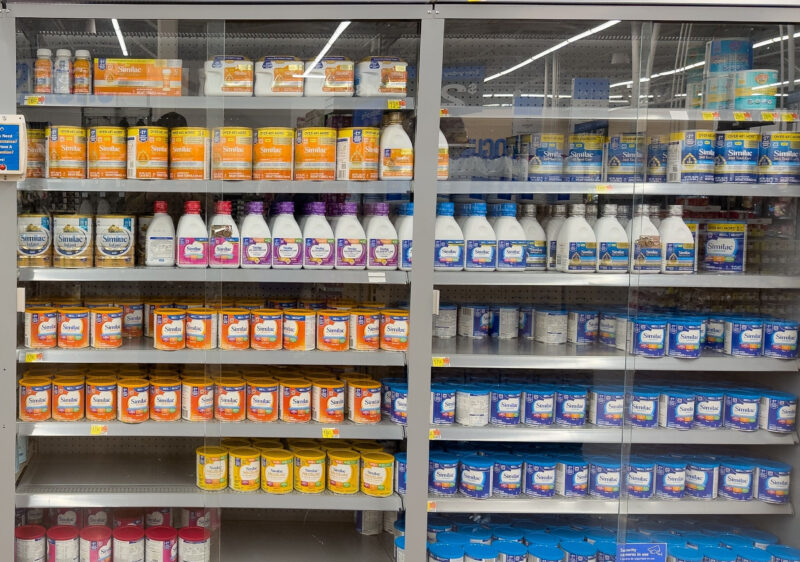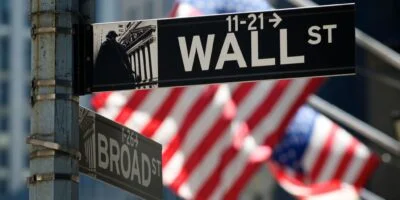Why is Baby Formula Kept Under Lock and Key?

A recent series of memes and social network one-liners purport to expose the moral bankruptcy of capitalism by asking rhetorically, “Why is baby formula kept under lock and key?” The explicit inference is that it is only a profound form of greed that would see such an essential good, critical to the most vulnerable human beings, being so securely held. It is at least shameful and more likely evil, the assertion continues, that infant formula is maintained in cages in supermarkets, revealing the sinister character of the profit system.
First, baby formula regularly appears on lists of the most shoplifted goods at supermarkets. Because it is expensive and occasionally prone to shortages, there exists a liquid, active black market supplied by sophisticated underground networks for baby formula. And owing to prohibition-fattened profit margins, formula constitutes a safe, accessible input for cutting drugs like cocaine, heroin, and methamphetamine.
An adamant collectivist is likely to argue that both shoplifting and drug addiction are afflictions of the desperate, the former a moral imperative and the latter an inevitable consequence of a world in which oppression and avarice run rampant. But such activists must concede that incentives inform choices. How else would the use of violence in the service of revolution be explained? In a market economy, businesses seek to generate revenue, and theft reduces sales. Locking up goods that are prone to robbery prevents stealing and ensures that products are available to paying customers desiring them. Copies of Das Kapital, a subscription to the Weekly Worker, and even admission to Karl Marx’ grave site are priced as well. And collectivist states are indefatigable adherents of walls, fences, barriers, prisons, and countless other forms of immuring.
Feigned or real, far-left outrage about secured baby formula is suspiciously selective. In fact, increasing numbers of retail items are being locked up. Following the mass looting in US cities throughout 2020 (and occurring even recently), alcohol, consumer non-durables, and even Spam has been moved from open shelving to sealed displays. (Liquor retailers have incentives beyond lost revenue to keep their merchandise safe from larcenists.)
In 2022, the circumstances around the retailing of baby food became all the more complicated as a result of supply chain problems caused by pandemic policies. A recall by Abbott created shortages that exposed little-known features of the market for infant formula. The global market is dominated by a small number of firms, with two firms—Abbott and Reckitt Benckiser—accounting for roughly 80 percent of the US domestic market. (Gerber, owned by the Swiss conglomerate Nestlé, controls another 10 percent.) Those firms are the only three licensed by the United States Department of Agriculture’s (USDA) Food and Nutrition Service to produce formulas for the Special Supplemental Nutrition Program for Women, Infants, and Children (WICs).
The federal government provides WIC grants to each state, which then contracts with one of the three companies. While WIC is a critical program to feed the most vulnerable, government support of this program… creat[es] a de facto monopoly in each state. The amount of WIC funding to these three established companies makes it difficult for any startup to make significant inroads in the baby formula industry. There is little chance they can capture the market share necessary to justify a significant investment.
The competitive landscape, as structured by the US government, makes entrepreneurial prospects a nonstarter. High tariffs heap yet another layer of cost to the retail price of baby food, lobbied for by the National Milk Producers Foundation.
While the 2022 baby formula crisis grappled the United States, the National Milk Producers Federation called on Congress to resist new action. In November, the group urged Congress to oppose any efforts to extend the tariff suspensions emergently granted to baby formula imports amidst the crisis. Unsurprisingly, Big Dairy succeeded—on January 1st, the tariffs returned on imports of infant formula meaning these imports are again subject to an effective tax of about 25 percent.
In response to the 2022 shortages, eight foreign companies were approved to sell infant formula in the US – but tariffs were reinstituted in early 2023, again raising prices. And there are two additional muddles, one at the production end and one at the consumer end: patents and inflation.
So why, in many stores, is infant food kept in locked cabinets? Collectivists, look no further than your beloved, doughty statesmen. The cogent, provable explanation is an array of government restrictions, each of which drives up retail prices on an already difficult-to-produce good. Patent restrictions, a deliberate oligopoly, protectionist tariffs, and the highest inflation in four decades have resulted in an extremely expensive product at the end of a frangible production process and supply chain. Explosions of civil unrest and the rapid growth of shoplifting (now approaching a $100 billion problem) have led vendors to physically restrict access to products that are frequently stolen. Those include, but are not limited to, baby formula.
There is indeed, as the memesters and social media wags suggest, a severe moral delinquency at work. But it is neither with the shopkeeper nor the choice of lock and key. It lies in the muster of interests which, through political power, conspire to prohibit the unhindered manufacture and distribution of critical goods.










